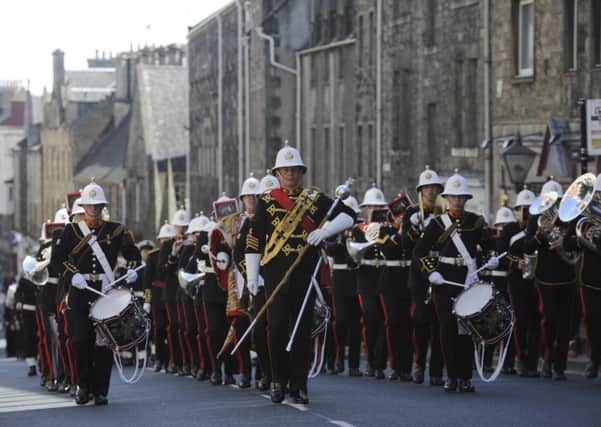Parades ordered to be silent when passing churches


Band music will be muted when passing churches and marchers will be restricted to walking no more than six abreast – but no less than four – to comply with a new Code of Conduct being drafted up at City Chambers.
Parades could be diverted away from the Royal Mile to reduce disruption to the tourist industry.
Advertisement
Hide AdAdvertisement
Hide AdUnder the new rules, every procession planned for the High Street will now be scrutinised by councillors and city officials in an effort to cut down on the number of events taking place there.
The measures follow complaints from businesses and churches that trade was being affected by an increasing number of parades and marches displaced from Princes Street since the launch of the tram line.
Campaigners have hit out at the plans, claiming they restrict freedom of speech.
Processions have been held on the Royal Mile in recent years, including a parade of veterans to mark Armed Forces Day, Edinburgh’s Riding of the Marches and the UK’s first Ginger Pride march.
The new restrictions are being proposed alongside a set of conditions that will act as ground rules for processions across the city for the first time.
Previously, conditions were placed on individual marches on an ad-hoc basis, taking into account advice from police. They bear some similarities to the anti-sectarian measures introduced in Northern Ireland.
Campaigners expressed concern the moves would restrict the right to protest.
Brian Larkin, a co-ordinator at the Edinburgh Peace and Justice Centre and an active figure in protests against nuclear weapons, said: “I can understand where the concern is coming from, however, I am a strong believer in the right of freedom of expression. I think that groups have every right to express their point of view, and if you begin to restrict that expression in the way that’s suggested, that is problematic because it’s the beginning of a slippery slope.”
Advertisement
Hide AdAdvertisement
Hide AdKirsty Haigh, a student activist and vice-president for communities at the National Union of Students, said council officials should be “very cautious” about restricting civil liberties.
She said: “It’s extremely worrying that the Edinburgh City Council is considering placing restrictions on the right to demonstrate. We should be very cautious about tampering with this vital part of our democracy.”
The measures are set to be approved at a meeting of the council’s Regulatory Committee on Monday.
Regulatory Committee convener Councillor Gavin Barrie said: “The council now receives an increasing number of notifications from organisations that wish to hold parades or processions on the High Street.
“To ensure this does not have an adverse affect on local businesses, tourism, or those who live there, the Regulatory Committee will decide whether special consideration should be given to parades using this route.
The new code
THE new Code of Conduct governing parades includes the following conditions:
• Any band or bands taking part in a parade/procession shall cease playing when approaching and passing any place of worship, whether or not services are in progress
• No vehicles or animals should be part of the procession unless by approval of Police Scotland and City of Edinburgh Council prior to the day of the event
Advertisement
Hide AdAdvertisement
Hide Ad• Unless by prior agreement, all persons participating in the parade shall not walk not more than six and not less than four abreast
• Banners, placards, flags and posters bearing inflammatory images or words will not be allowed to be displayed
• Any instructions given by the police or council officers are immediately complied with.